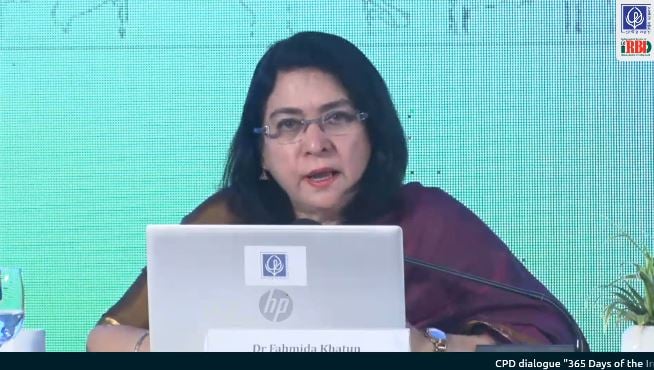News Flash
News Flash

DHAKA, Aug 10, 2025 (BSS) – The economy of the country has been saved from big-scale disaster due to the various initiatives and reforms taken by the interim government over the last one year following the changeover of power, said Executive Director of CPD Dr Fahmida Khatun.
“Over the last one year, the interim government has taken a good number of reform initiatives of which the banking sector reform was one of the initiatives. As a result, the inward remittances and export earnings have increased while foreign currency reserve has reached a good position through halting its downfall,” she said.
Dr Fahmida was addressing at a dialogue organized by the Centre for Policy Dialogue (CPD) on “365 Days of the Interim Government” at a hotel in the capital today.
The CPD said although the interim government was able to ease inflation following its assuming of responsibility last year, but underlying institutional weaknesses, such as low revenue collection, continue to pose challenges for the economy.
“Inflation may have eased, but many persistent challenges remain,” added Fahmida.
Highlighting CPD's scorecard on the government's first year, she said that the recent decline in inflation is a positive sign, but it does not fully reflect improvements in the broader economic structure,
The scorecard used green, yellow and red indicators to assess 38 issues based on benchmarks set last year.
CPD’s assessment showed that inflation control fell into the green zone.
Fahmida Khatun mentioned that exports, imports, reserves, and remittances are good while the trade balance has come down.
The CPD also highlighted the issue of unemployment and insufficient reforms in public sector management, noting that these factors limit the benefits of short-term improvements in economic indicators.
CPD Distinguished Fellow Professor Mustafizur Rahman said that the primary goal of the interim government when it assumed responsibility was to restore the macroeconomic stability. “Now the macroeconomic stability has been restored,” he added.
He said the CPD had set out expectations for the interim government last year and now it was time to take stock.
On 14 August 2024, the CPD discussed what the expectations of the interim government were and thus presented them, he said.
“At that time, there was high inflation, rising unemployment, devaluation of the currency, a decline in ADP implementation, falling remittance and export earnings, a decline in reserves, and low investment. There was a challenge in macroeconomy,” Professor Mustafizur added.
“Now we’re looking back after one year. There is a need for an evaluation. How do the scorecards look on various key indicators?” he asked, noting that some targets had been met, others had not, and some initiatives were only just beginning.
Mustafizur said there has been progress in several areas while some have not met expectations. “Some have just started. The future political government will have to do them,” he said.
He warned that while stability is emerging, the major test will be translating that stability into investment and job creation.
“The challenge is to convert these changes into investments and bring comfort or relief to people's lives by creating employment,” he said.
The CPD's scorecard was presented as a tool to guide that process and inform the next phase of economic policymaking.
According to the organisation, addressing these structural weaknesses will be critical to sustaining economic stability and ensuring long-term growth.
Beyond inflation and revenue concerns, the CPD's review flagged deep-rooted issues across multiple sectors.
While the boards of 14 banks were dissolved and reorganised, and three task forces formed, CPD noted that the true scale of bad loans and asset quality still needs thorough review.
Bangladesh Bank's adoption of international loan classification standards was praised, along with Taka 23,000 crore in special credit line support to restore lending.
The capital market showed little progress, with continued instances of companies raising funds and exiting.
In contrast, SME lending policies requiring banks to allocate at least 25% of loans to the sector were viewed positively, as was the creation of a youth fund and enhanced financial support for migrant workers.
CPD found export diversification and tariff reforms for post-LDC graduation lacking, alongside delays in updating labour policy.
Agricultural subsidies for key food items have been raised, but broader energy security challenges remain, CPD noted.
CPD marked the recently introduced renewable energy policy as a positive move.
On governance and social spending, CPD noted investment in physical infrastructure but little in social sectors.
In mobile financial services, it credited efforts to curb waste and fraud. However, recommendations from the White Paper have seen little follow-through, and preparations for LDC graduation remain inadequate.
With the national election set for February 2026, CPD cautioned that major reforms are unlikely in the coming months, but urged the government to sustain macroeconomic stability measures, continue inflation control, expand open market sales, and maintain support for the ultra-poor.